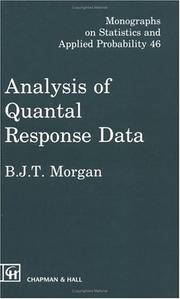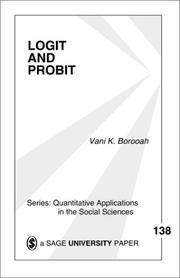| Listing 1 - 10 of 14 | << page >> |
Sort by
|
Book
ISBN: 9781412984829 Year: 2002 Publisher: Thousand Oaks, [Calif.] ; London : SAGE,
Abstract | Keywords | Export | Availability | Bookmark
 Loading...
Loading...Choose an application
- Reference Manager
- EndNote
- RefWorks (Direct export to RefWorks)
Many problems in the social sciences are amenable to analysis using the analytical tools of logit and probit models. This book explains what ordered and multinomial models are and also shows how to apply them to analysing issues in the social sciences.
Book
ISBN: 9781412984744 Year: 1984 Publisher: Newbury Park, [Calif.] ; London : SAGE,
Abstract | Keywords | Export | Availability | Bookmark
 Loading...
Loading...Choose an application
- Reference Manager
- EndNote
- RefWorks (Direct export to RefWorks)
After showing why ordinary regression analysis is not appropriate for investigating dichotomous or otherwise 'limited' dependent variables, this volume examines three techniques which are well suited for such data. It reviews the linear probability model and discusses alternative specifications of non-linear models.
Probabilities. --- Logits. --- Probits.
Book
ISBN: 9781412984577 Year: 1994 Publisher: Thousand Oaks, [Calif.] ; London : SAGE,
Abstract | Keywords | Export | Availability | Bookmark
 Loading...
Loading...Choose an application
- Reference Manager
- EndNote
- RefWorks (Direct export to RefWorks)
What is the probability that something will occur, and how is that probability altered by a change in an independent variable? To answer these questions, Tim Futing Liao introduces a systematic way of interpreting commonly used probability models.
Book
ISBN: 3658026626 Year: 2013 Publisher: Wiesbaden : Springer Gabler,
Abstract | Keywords | Export | Availability | Bookmark
 Loading...
Loading...Choose an application
- Reference Manager
- EndNote
- RefWorks (Direct export to RefWorks)
Neuere methodische Weiterentwicklungen der Conjoint-Analyse ermöglichen heute die simultane Segmentierung eines Gesamtmarktes von Konsumenten in homogene Teilmärkte und die Schätzung entsprechender segmentspezifischer Teilnutzenwertstrukturen. Auf diesem Wege soll der Heterogenität im Konsumentenverhalten Rechnung getragen werden. Das im Rahmen der simultanen Segmentierung derzeit meistgenutzte Conjoint Choice-Modell ist das Finite Mixture Logitmodell. Dieses unterstellt Unabhängigkeit der Gesamtnutzen aller Alternativen, die einem Konsumenten zur Auswahl gestellt werden, und postuliert somit, dass Auswahlentscheidungen unabhängig vom Kontext sind, in dem die Alternativen dem Konsumenten präsentiert werden. Diese Annahme erscheint in Bezug auf die Abbildung realen Kaufverhaltens jedoch fraglich. Friederike Paetz entwickelt ein Finite Mixture Multinomiales Probitmodell, welches explizit Abhängigkeiten zwischen (den Gesamtnutzen der) Alternativen berücksichtigen kann. Abhängigkeiten zwischen Alternativen können einerseits innerhalb eines Choice Sets und andererseits durch die Erinnerung an Alternativen vorangegangener Auswahlsituationen entstehen. Das neu entwickelte Modell wird anschließend sowohl in einer Simulationsstudie als auch in einer empirischen Studie mit Modellen, die Unabhängigkeit unterstellen, verglichen. Der Inhalt · Theoretische Grundlegung: Finite Mixture Multinomiales Probitmodell · Finite Mixture Independent Probitmodell · Modellprüfung durch Simulations- und empirische Studie · Kontexteffekte und Heterogenität. Die Zielgruppen · Dozierende und Studierende der Betriebswirtschaftslehre mit Schwerpunkt Marketing, Kaufverhaltensforschung und stochastischer Modellierung sowie der Mathematik · Marketing- und MarktforschungsberaterInnen, die das Kaufverhalten analysieren Die Autorin Friederike Paetz studierte Mathematik mit Nebenfach Betriebswirtschaftslehre an der Universität Paderborn und ist seit 2008 Wissenschaftliche Angestellte am Institut für Wirtschaftswissenschaft der TU Clausthal.
Marketing. --- Consumer behavior --- Probits. --- Mathematical models.

ISBN: 0412317508 1489945393 0367450240 1351466674 1315137410 1351466666 9780412317507 Year: 1992 Volume: 46 Publisher: London : Chapman and Hall,
Abstract | Keywords | Export | Availability | Bookmark
 Loading...
Loading...Choose an application
- Reference Manager
- EndNote
- RefWorks (Direct export to RefWorks)
Mathematical statistics --- Biometry --- Probits --- Medical statistics --- Biometry. --- Medical statistics. --- Probits. --- Quantum statistics. --- Biochemistry. --- Biochemistry, general.

ISBN: 1584880457 Year: 2000 Publisher: Boca Raton : Chapman & Hall/CRC,
Abstract | Keywords | Export | Availability | Bookmark
 Loading...
Loading...Choose an application
- Reference Manager
- EndNote
- RefWorks (Direct export to RefWorks)
Drug synergism. --- Drug synergism --- Probits. --- Drugs --- Drug Synergism. --- Data Interpretation, Statistical. --- Dose-Response Relationship, Drug. --- Chemotherapy, Combination. --- Regression Analysis. --- Probits --- Mathematics. --- Dose-response relationship
Book
ISBN: 9155431623 Year: 1993 Publisher: Uppsala : Almqvist & Wiksell : Acta universitatis upsaliensis,
Abstract | Keywords | Export | Availability | Bookmark
 Loading...
Loading...Choose an application
- Reference Manager
- EndNote
- RefWorks (Direct export to RefWorks)
Parameter estimation --- Probits --- Biomathematics --- Distribution (Probability theory) --- Probabilities --- Transformations (Mathematics) --- Estimation theory --- Stochastic systems --- Statistiques ordonnees

ISBN: 0803921330 1412984742 1452211108 0585216932 9780803921337 Year: 1984 Volume: 45 Publisher: Newbury Park, [Calif.] ; London : SAGE,
Abstract | Keywords | Export | Availability | Bookmark
 Loading...
Loading...Choose an application
- Reference Manager
- EndNote
- RefWorks (Direct export to RefWorks)
After showing why ordinary regression analysis is not appropriate for investigating dichotomous or otherwise 'limited' dependent variables, this volume examines three techniques which are well suited for such data. It reviews the linear probability model and discusses alternative specifications of non-linear models.
519.2 --- Probits --- #WWIS:STAT --- Biomathematics --- Distribution (Probability theory) --- Probabilities --- Transformations (Mathematics) --- 519.2 Probability. Mathematical statistics --- Probability. Mathematical statistics --- Logits --- Logits. --- Probits. --- Logit transformation --- Logarithms --- Probability --- Statistical inference --- Combinations --- Mathematics --- Chance --- Least squares --- Mathematical statistics --- Risk --- Probabilities. --- #SBIB:303H10 --- #SBIB:303H520 --- Methoden en technieken: algemene handboeken en reeksen --- Methoden sociale wetenschappen: techniek van de analyse, algemeen --- PROBABILITES --- MODELES --- SCIENCES SOCIALES --- METHODES QUANTITATIVES
Book
ISBN: 052108041X 9780521080415 Year: 1971 Publisher: London: Cambridge university press,
Abstract | Keywords | Export | Availability | Bookmark
 Loading...
Loading...Choose an application
- Reference Manager
- EndNote
- RefWorks (Direct export to RefWorks)
Mathematical statistics --- Estimation theory --- Biomathematics --- Probits --- Théorie de l'estimation --- Biomathématiques --- 519.2 --- Distribution (Probability theory) --- Probabilities --- Transformations (Mathematics) --- Estimating techniques --- Least squares --- Stochastic processes --- Biology --- Mathematics --- Probability. Mathematical statistics --- Biomathematics. --- Estimation theory. --- Probits. --- Basic Sciences. Mathematics --- Applied Mathematics --- Applied Mathematics. --- 519.2 Probability. Mathematical statistics --- Théorie de l'estimation --- Biomathématiques --- STATISTICS --- Monograph --- Statistics. --- Statistical analysis --- Statistical data --- Statistical methods --- Statistical science --- Econometrics

ISBN: 0761922423 1412984823 1452211337 9780761922421 Year: 2002 Volume: 138 Publisher: Thousand Oaks, [Calif.] ; London : SAGE,
Abstract | Keywords | Export | Availability | Bookmark
 Loading...
Loading...Choose an application
- Reference Manager
- EndNote
- RefWorks (Direct export to RefWorks)
Many problems in the social sciences are amenable to analysis using the analytical tools of logit and probit models. This book explains what ordered and multinomial models are and also shows how to apply them to analysing issues in the social sciences.
Mathematical statistics --- Social sciences --- Probabilities --- Logits --- Probits --- Statistical methods --- 519.2 --- #SBIB:303H10 --- #SBIB:303H520 --- #PBIB:2003.3 --- -Probabilities --- Biomathematics --- Distribution (Probability theory) --- Transformations (Mathematics) --- Logit transformation --- Logarithms --- Probability --- Statistical inference --- Combinations --- Mathematics --- Chance --- Least squares --- Risk --- Behavioral sciences --- Human sciences --- Sciences, Social --- Social science --- Social studies --- Civilization --- Probability. Mathematical statistics --- Methoden en technieken: algemene handboeken en reeksen --- Methoden sociale wetenschappen: techniek van de analyse, algemeen --- Logits. --- Probabilities. --- Probits. --- Statistical methods. --- 519.2 Probability. Mathematical statistics --- Social sciences - Statistical methods
| Listing 1 - 10 of 14 | << page >> |
Sort by
|

 Search
Search Feedback
Feedback About UniCat
About UniCat  Help
Help News
News